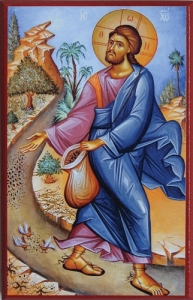To you, it has been given to know the mysteries of the Kingdom of God
The ground on which the God-Man Jesus Christ sows the seed, that is, His word, is the spiritual heart of man; there is the essence of our mind. He sows it through those people of the Church who truly bear witness to Him. And they, on the other hand, sow it through their spoken or written word – word with power, i.e. through the word supported by deeds.
From today’s Gospel reading, regarding the parable of the sower (see Luke 8, 5–15) the part about the seed that fell into the thorns is especially relevant to us, my thoughts on this are: just as the thorns are an obstacle for the fields to bring forth good fruit, so our sins are an obstacle for our hearts to bring forth the good fruit of virtue. Simultaneously, I say to myself, the spikes of the thorns are as a sin committed by deed, the leaf – a sin committed with words, the branches – a sin committed with thoughts.
The thorns in the field of our hearts, that is, our sins that we commit by deed, word, and thought, certainly have a root. What would be the root of the sin, if not the passions nested in our hearts (self-love with its three subgroups: vainglory, covetousness, and love of pleasures), assisted by the demons associated with them.
The captivity of the heart by the passions, and the demons associated with them, does not allow the grace of Baptism to manifest itself and act freely outside our heart, throughout our whole being and beyond us; it does not give room to the evangelical (gospel) word sown in our hearts to grow and bring forth both personal and catholical fruit of repentance, that is “change of mind.”
If we want the seed to bring forth fruit, we need to clean the ground of the thorns and remove the thorns together with their roots. But to get to the root, we need to start destroying the thorn from the top. So, we should stop sinning with deeds, then with words, and at then with thoughts.
An open heart is fertile ground for the one who is at the second stage of spiritual development, and the fruit is the prayer of the mind in the heart. For the one who is at the stage of purification of his heart from the passions, the fertile ground is the obedience to spiritual father. For all who live in the world, on the other hand, the fertile ground is, the specific deeds of helping those who suffer.
All of this does not mean that in our heart, while we are in the process of purification of our heart from the passions, there is not one part which is a good ground, another part that is a place by the wayside, a third part that is a rocky ground, and a part which represents thorns; it depends on our struggle.
The wayside, for us means that we either do not have enough faith or we do not have experience in the struggle. The spiritual father teaches us, but the demon comes and erases that which was said to us because the lesson (instruction) is remembered only if it is practiced with faith by deed. The rocky ground is the hiree relationship and the asceticism without continuity – if we have grace we asceticize, and if the grace is hidden from us, the asceticism ceases.
The thorns appear when the worries of this world overwhelm us, and we abandon the ascetic-hesychastic struggle. Either we are in a struggle, or we are not; there is no third option. The good and fertile ground is the actual faith in the God-Man Jesus Christ, in the beginning, translated into obedience by deed.
It is bad that the common end of the first three described situations with the seed is the lack of fruit. For the monks, that fruit is the prayer of the mind in the heart. This prayer cannot be a special and unique struggle, but it is the crown of the overall, properly lived, spiritual Orthodox life and struggle. And in general, there can be no question of spiritual life, in the true sense of the word, without the gift of prayer in the heart.
We can talk about ethics, manners, but not about Orthodox spiritual life in the true sense. We can potentially talk about that at the first stage, but only after we enter into the obedience to the spiritual father and harmonize our way of life with the stage of purification of the heart from the passions, i.e. with the spiritual stage we are at.
“He who has ears to hear, let him hear!” Which means: he who believes, let him put that in action, by deed!
Most Holy Theotokos, save us!
Metropolitan of Strumica Nahum
(13.11.2021 16:51)

